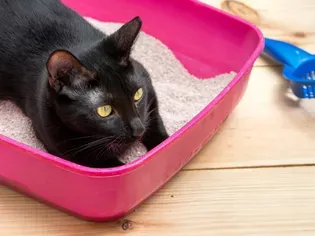Blood in Your Cat's Urine
Updated on 04/26/24

Blood in Your Cat's Urine: A Comprehensive Guide for Concerned Cat Owners
Introduction: Understanding the Significance
Blood in the urine, medically known as hematuria, is a concerning symptom that requires immediate attention from a veterinarian. It can indicate a wide range of underlying medical conditions, some of which can be life-threatening if left untreated. In this comprehensive guide, we will delve into the causes, symptoms, diagnosis, and treatment of hematuria in cats.
Causes: Unraveling the Underlying Issues
The presence of blood in a cat's urine can stem from various sources:
* Lower urinary tract conditions: These include cystitis (inflammation of the bladder), urethritis (inflammation of the urethra), and urinary tract stones, which can cause irritation and bleeding.
* Upper urinary tract conditions: Kidney disease, kidney stones, and certain types of cancer can affect the kidneys and ureters, leading to the passage of blood in the urine.
* Systemic diseases: Conditions such as anemia, low blood platelets, and blood clotting disorders can cause widespread bleeding, including in the urinary tract.
* Trauma: Injuries to the urinary tract, such as a cat fight or a fall, can result in blood being present in the urine.
Symptoms: Decoding Your Cat's Concerns
Hematuria may manifest in different ways, depending on the underlying cause:
* Macroscopic hematuria: Visible blood in the urine, giving it a pink or reddish hue.
* Microscopic hematuria: Microscopic amounts of blood detected only through a urine analysis.
* Dysuria: Difficulty or pain during urination, accompanied by straining or vocalizing.
* Pollakiuria: Frequent urination.
* Other possible symptoms: Lethargy, loss of appetite, weight loss, and vomiting.
Diagnosis: Unveiling the Underlying Cause
Diagnosing the cause of hematuria in cats requires a thorough approach:
* Medical history: Gathering information about your cat's symptoms, previous medical conditions, and any recent trauma or stressful events.
* Physical examination: Assessing your cat's overall health, including palpation of the abdomen and examination of the urinary tract.
* Urine analysis: Microscopic examination of the urine to detect blood cells, crystals, or other abnormalities.
* Imaging tests: X-rays, ultrasound, or CT scans may be used to visualize the urinary tract and identify underlying conditions.
* Blood tests: Bloodwork can assess anemia, low blood platelets, and other systemic diseases.
Treatment: Tailoring to the Underlying Cause
Treatment for hematuria depends on the specific underlying cause:
* Lower urinary tract conditions: Antibiotics, anti-inflammatories, and pain relievers may be prescribed. In severe cases, surgery may be necessary to remove urinary stones.
* Upper urinary tract conditions: Treatment varies depending on the underlying disease. For kidney disease, dietary changes, medications, and fluid therapy may be recommended. Surgery may be necessary for certain types of cancer.
* Systemic diseases: Underlying systemic conditions must be addressed and treated. This may involve medications, transfusions, or other therapies.
* Trauma: Treatment aims to stabilize the cat and address any underlying injuries. Antibiotics may be necessary to prevent infection.
Prevention: Proactive Measures
While not all causes of hematuria can be prevented, proactive measures can help minimize the risk:
* Regular veterinary checkups: Regular checkups allow early detection and treatment of underlying health conditions.
* Adequate hydration: Encouraging your cat to drink plenty of water helps flush out the urinary tract and reduce the risk of urinary tract infections and stone formation.
* Balanced diet: A balanced diet provides essential nutrients and supports urinary tract health.
* Stress reduction: Providing a calm and stress-free environment for your cat can help reduce the risk of certain health conditions, including lower urinary tract diseases.
Conclusion: Empowering You with Knowledge and Action
Blood in your cat's urine is a serious symptom that should not be ignored. By understanding the causes, symptoms, and treatment options for hematuria, you can make informed decisions and advocate for your cat's well-being. Remember to consult your veterinarian promptly if you observe any signs of blood in your cat's urine. Your veterinarian will provide the necessary diagnosis and treatment, ensuring the best possible outcome for your beloved companion.
Explore More Pets

Cat Behavior Problems
How to Stop Aggression in Kittens

Long-Haired Cat Breeds
Siberian Cat: Breed Profile, Characteristics, & Care

Cat Behavior Problems
How to Stop Kittens From Scratching and Biting

Long-Haired Cat Breeds
Turkish Angora: Cat Breed Profile, Characteristics & Care

Basic Training
How to Socialize Your Kitten

Short-Haired Cat Breeds
Cute Pictures & Facts About Calico Cats & Kittens

Litter Box Training
Training Your Kitten to Use the Litter Box

Long-Haired Cat Breeds
10 Fun Facts About White Cats